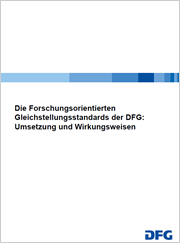Research-Oriented Standards on Gender Equality

In 2008, the member organisations of the DFG made a voluntary commitment to the Research-Oriented Standards on Gender Equality. These standards were designed to help increase the participation of women in research at all career levels in the German research system and establish gender equality as a matter of concern at management level.
The study ‘Research-Oriented Standards on Gender Equality: Implementation and Impact’ reviews the measures and outcomes of the Research-Oriented Standards on Gender Equality. It was prepared by the DFG with the involvement of JOANNEUM (JOANNEUM RESEARCH Forschungsgesellschaft mbH, Vienna) and CEWS (Center of Excellence Women and Science of GESIS - Leibniz-Institute for the Social Sciences, Cologne). The study is based on various sources of data and analytical approaches. It traces the trend in the representation of female researchers in a national and international context on the basis of official statistics and reports from the Joint Science Conference (GWK) on the current 426 higher education institutions in Germany. For the 68 member institutions of the DFG who were involved in the implementation of the Research-Oriented Standards on Gender Equality, the study examines how the number of women on the academic staff has developed and to what extent the voluntary targets have been met. Within the scope of the Research-Oriented Standards on Gender Equality, the members have prepared gender equality reports every two years (2009, 2011, 2013) describing the measures they have implemented. Drawing on the reports from a random sample of 31 institutions, a data set of approximately 3,000 equality measures was compiled (by CEWS), allowing the type and development of measures to be analysed. In addition, 30 interviews were conducted with individuals from five selected institutions, all of whom have roles relevant to gender equality (carried out by JOANNEUM). These case studies provide an insight into decision-making, implementation and effect processes at central and local level.
The study on the implementation and impact of the Research-Oriented Standards on Gender Equality, presented to the General Assembly in 2017, was used to prepare and support decision-making on the future of the standards. Building on the results of the study, a working group appointed by the General Assembly drew up recommendations for the future of the Research-Oriented Standards on Gender Equality.
- Study: "Research-Oriented Standards on Gender Equality – Implementation and Impact" (in German only(Download)
- Statement and recommendations of the working group on the Research-Oriented Standards on Gender Equality (in German only(Download)
- Further information concerning the implementation of the Research-Oriented Standards on Gender Equalit(interner Link)